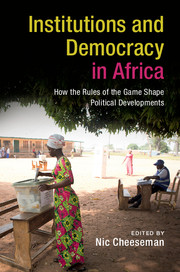Book contents
-
Frontmatter
-
Dedication
-
Contents
-
List of Figures
-
List of Tables
-
List of Contributors
- 1
Introduction: Understanding African Politics: Bringing the State Back In
- Part I
Institutional Foundations
- Part II
Law and Order
- Part III
Elections, Parties and Political Competition
- 8
Political Parties: Presidential Succession Crises and Internal Party Democra
- 9
Elections: The Power of Elections in Multiparty Africa
- 10
Electoral Rules: The Relationship between Political Exclusion and Conflict
- 11
Term Limits: Leadership, Political Competition and the Transfer of Power
- Part IV
Countervailing Institutions
-
Index
- References
11 - Term Limits: Leadership, Political Competition and the Transfer of Power
from Part III - Elections, Parties and Political Competition
Published online by Cambridge University Press: 05 February 2018
- Frontmatter
- Dedication
- Contents
- List of Figures
- List of Tables
- List of Contributors
- 1 Introduction: Understanding African Politics: Bringing the State Back In
- Part I Institutional Foundations
- Part II Law and Order
- Part III Elections, Parties and Political Competition
- 8 Political Parties: Presidential Succession Crises and Internal Party Democra
- 9 Elections: The Power of Elections in Multiparty Africa
- 10 Electoral Rules: The Relationship between Political Exclusion and Conflict
- 11 Term Limits: Leadership, Political Competition and the Transfer of Power
- Part IV Countervailing Institutions
- Index
- References
Summary
If institutions are rules that restrain political actors, then the most important institutions that constrain the most important political actors are the rules that tell presidents how and when they must relinquish power. The most significant of these are the constitutional provisions that restrict presidents to two terms in office. Since 1990, such term limits have been put in place in all but seven of the forty-seven countries in sub-Saharan Africa that have non-ceremonial heads of state. This chapter explores how African leaders have responded to these limits. Our findings suggest that these constitutional checks on presidential power are real and that they have come to constrain African leaders in ways that were almost unimaginable in earlier eras.
In the first decades after independence from European colonial rule, African leaders were rightly depicted as ‘big men’, unconstrained by the rules that formally limited their power (Jackson and Rosberg 1982; Chabal and Daloz 1999; Hyden 2006). Authority in this era stemmed from a combination of military might, intimidation and the command of informal networks. Leaders entered and exited office not through elections or other regular means but primarily through the barrel of a gun. In this era, it was almost unthinkable that a head of state would relinquish power simply because a clause in the constitution said that he must. Much more likely, he would ignore the provision and simply declare himself (or have the legislature he controlled declare him) ‘President for Life’ – as Kwame Nkrumah did in 1964, Hastings Banda did in 1970, Jean-Bédel Bokassa and Francisco Macías Nguema did in 1972 and Idi Amin did in 1976. Many other African leaders effectively did the same, even if they never adopted the formal title.
But by the 1990s, things began to change. The modal means by which African leaders surrendered power shifted from coup d’état to voluntary resignation, either due to term limits or following a defeat in a relatively free and fair election. Political power also became much more institutionalised during the intervals between elections. Although not every African country during this period moved towards greater constraints on executive authority, the overall shift in this direction was discernible. Across the continent, the unfettered ‘personal rule’ that had previously characterised the politics of the region began to be displaced by a more rule-bound, institutionalised political order.
- Type
- Chapter
- Information
-
Institutions and Democracy in AfricaHow the Rules of the Game Shape Political Developments, pp. 260 - 278Publisher: Cambridge University PressPrint publication year: 2018
References
- 31
- Cited by



